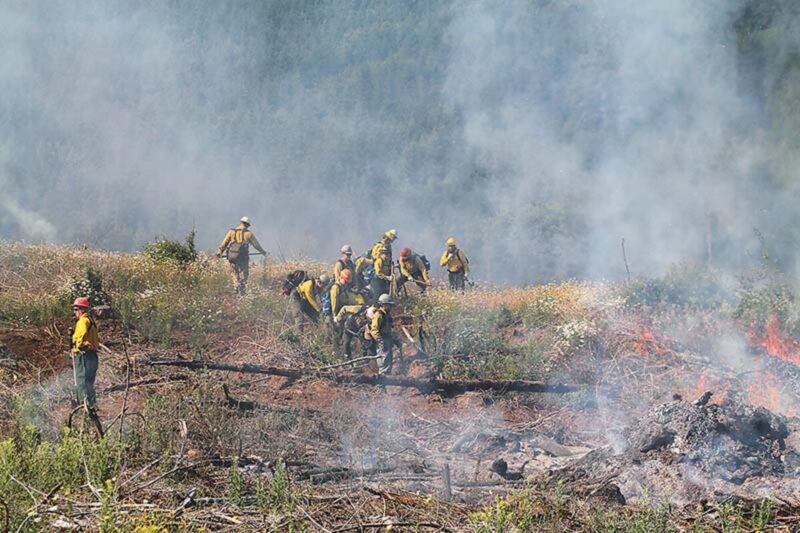Sarah Brown
With fire season already active and regulated use restrictions in place since Monday, July 2, Chad Calderwood of the Oregon Department of Forestry’s Sweet Home Unit advises residents and visitors be “fire smart.”
Put campfires out before leaving, clean up garbage and perform fuel reduction cleaning around houses, he counseled.
“They’re predicting drier than normal conditions. We haven’t had a whole lot of rain, so we’re looking at above average fire season,” he said.
To prepare for fire season, the Mid-Willamette Valley Interagency Wildland Fire School held its 22nd annual training June 25 to 29 at Sweet Home High School.
More than 200 students and instructors from agencies across western Oregon spent last week sleeping in tents on the high school field, eating meals together and listening to morning briefs to simulate life in a real wildland firefighting operation.
The program was put on in a joint effort by U.S. Forest Service, Oregon Department of Forestry, U.S. Fish and Wildlife Service, Confederated Tribes of Grand Ronde, and Bureau of Land Management.
The first four days involved intense classroom training, followed by a live fire training on the Marks Ridge 400 line, an opportunity provided by Cascade Timber Consulting.
“They won’t let you go out onto a fire unless you have this level of training,” said Jim Gersbach, public information officer for ODF in Salem. “This training is very important because it brings in people that can be available through the peak fire seasons.”
The four days of classroom training at the Wildland Fire School included basic fire behavior; weather, map and compass use; teamwork; safety; use of engines, tools and hose lays; fighting fire in the rural-urban interface; and fire investigation.
The live fire exercise allowed trainees to work in smoke, hike through uneven terrain, and work closely as a team to dig firelines.
This year, three Ukrainians participated in the fire school. A translator explained this is the first year the Ukraine has sent professional firefighters and university professors to participate in fire training programs across the U.S.
Kelton Gaskey and Noah Taraski were among the ODF Sweet Home crew who participated in the training. Both graduated from high school this year and are preparing for a life of service.
Gaskey plans on attending Chemeketa Community College this fall to pursue a career in firefighting.
“I want to do professional firefighting, hopefully structural for Lebanon,” he said.
His dad, Brent Gaskey, is a lieutenant at Lebanon Fire District and played a role in influencing his son to consider firefighting as a career, Kelton said. Growing up, the 18-year-old watched firefighters “always doing stuff” and thought it would be fun.
After experiencing a week of firefighting, he would advise others who are considering the same career to just try it.
“If you’re up for a challenge and you like the outdoors, like I do, it’s a ton of fun,” Gaskey said. “The guys – and girl – I work with are all great people. They’ll all take care of you when you need it.”
However, Gaskey also considered going the military route.
“The more I thought about it, the more I thought firefighting sounds like a ton of fun. I love the Willamette Valley, so I didn’t really want to leave,” Gaskey said.
Taraski also has thought about both military and firefighting careers. He’s planning on doing both.
The 18-year-old moved to Sweet Home about six years ago and started learning structure firefighting techniques two years later while also serving on the county’s Search and Rescue squad. He received his Firefighter I accreditation about a year ago.
“From there, once you get structure fire, the next thing they kinda push you on is more rescue and wildland. I went about a year wanting to do it, and the season came around and I applied, and here I am,” Taraski said.
What he learned is that wildfire goes at a faster pace than structural.
“Just get in, get it done, get out. When there’s a structure fire, there’s different ways of attacking the house fire, but here you’re on scene and you’re progressive the whole way, you’re moving on it and fighting it the whole time,” he said.
Taraski plans to head for the Air Force at the end of the season for a four-year stint, but said he would love to return to Sweet Home and work at the fire department. It’s fun despite the hard work, he said.
“For avid people, this is the perfect job. You get paid to hike out somewhere and have some fun, meet really great people, and go to some places,” Taraski said.
If he had one takeaway from the week’s training, he said it would be safety.
“If something goes wrong, you’re deploying your shelters. You always need your back-up plan and your safety zones. Safety is big.”





